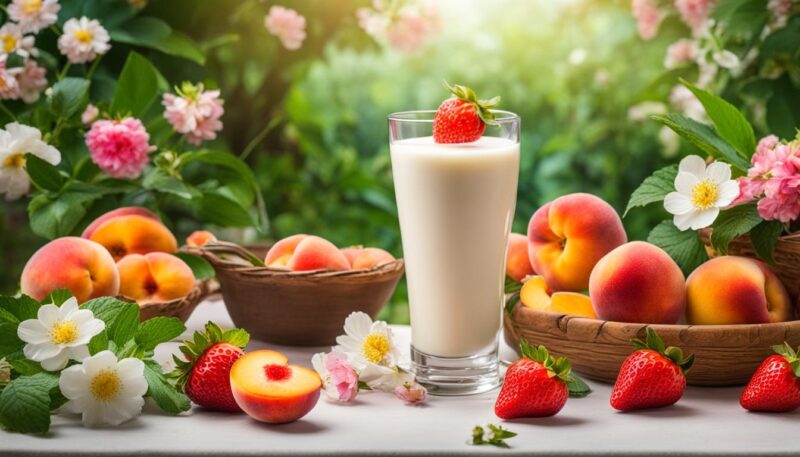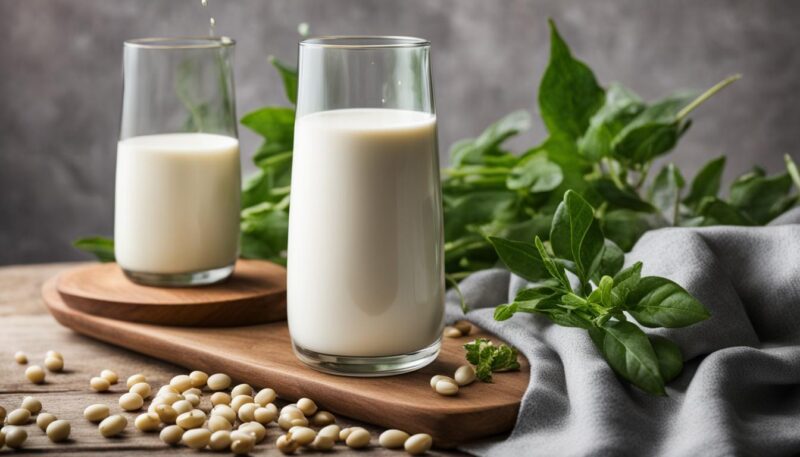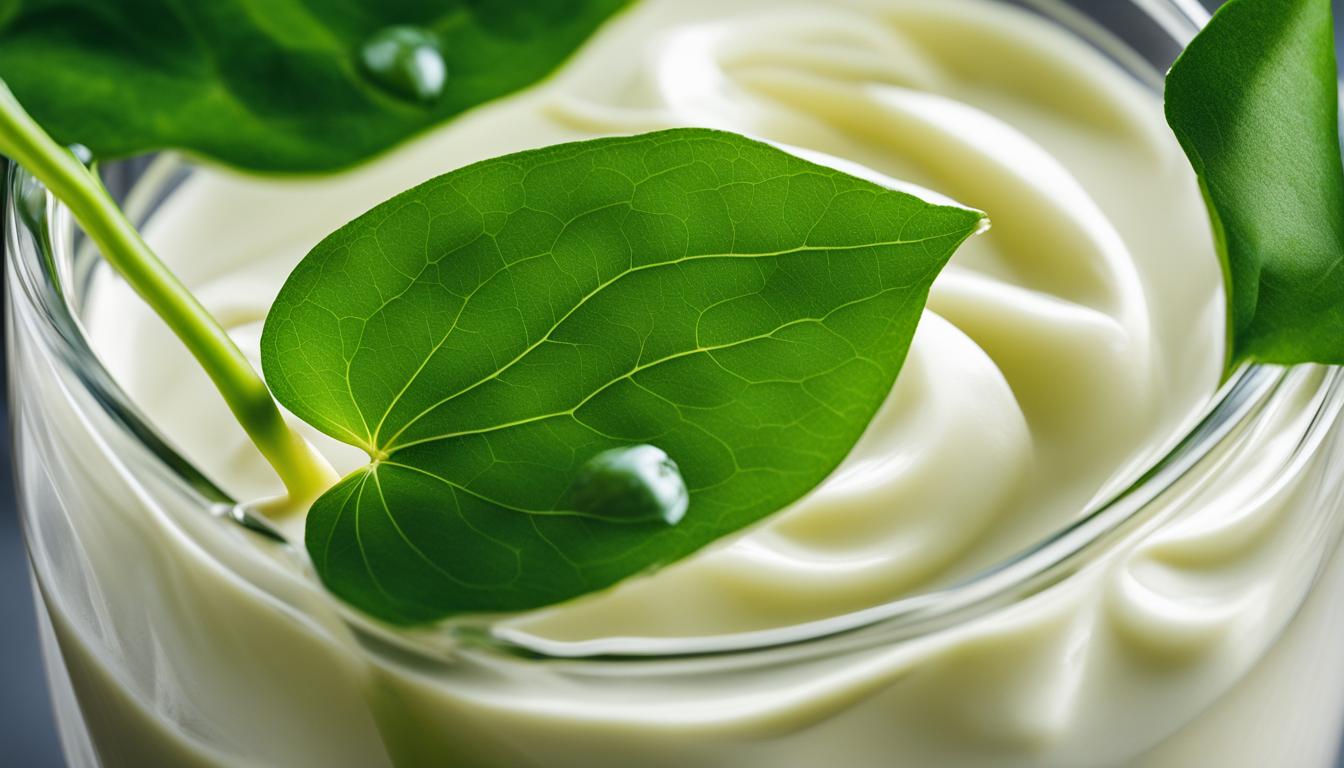The demand for vegan milks, such as soy milk, almond milk, and oat milk, has been steadily increasing as people seek cruelty-free and environmentally friendly alternatives to dairy milk. Silk soy milk is one popular brand that offers a range of flavors and varieties. It is a great option for vegans looking for a nutritious and tasty plant-based milk alternative.
Key Takeaways:
- Silk soy milk is a popular brand of vegan milk.
- Plant-based milks are in high demand as people look for cruelty-free and environmentally friendly alternatives to dairy milk.
- Silk soy milk is a nutritious and tasty option for vegans.
- Vegan milks, like Silk soy milk, are lower in saturated fat and higher in nutrients compared to dairy milk.
- Choosing a plant-based milk depends on personal preferences and dietary needs.
Why Choose Vegan Milk?
When it comes to choosing a milk alternative, vegan milk offers numerous benefits over traditional dairy milk. Not only does it provide a cruelty-free option, but it also has a lower impact on the environment. Let’s explore why more people are opting for vegan milk like Silk soy milk and its positive impact on both animal welfare and the planet.
The Benefits for Animal Welfare
Vegan milk production does not involve the mistreatment of animals commonly found in the dairy industry. Cows in factory farms endure a cycle of impregnation, separation from their calves, and constant milk production. By choosing vegan milk, you can contribute to ending this cycle of exploitation and support a more compassionate alternative.
The Environmental Impact
The dairy industry is a significant contributor to greenhouse gas emissions, deforestation, and water pollution. On the other hand, vegan milk production has a lower carbon footprint and requires fewer resources. By choosing vegan milk, you are making a positive impact on the environment, helping to reduce your carbon footprint, and supporting a more sustainable food system.
Nutritional Benefits
Aside from the ethical and environmental advantages, vegan milk also offers several nutritional benefits. Silk soy milk, for example, is lower in saturated fat and higher in nutrients like calcium and protein compared to dairy milk. It provides a nourishing alternative for vegans and individuals with dietary restrictions or preferences.
By choosing vegan milk, like Silk soy milk, you are not only making a conscious choice for your health but also for the well-being of animals and the planet. With its ethical, environmental, and nutritional benefits, vegan milk is an excellent option for those looking to embrace a more compassionate and sustainable lifestyle.
Nutrition in Silk Soy Milk
Silk soy milk is a nutritionally rich plant-based milk option that offers a range of benefits for those following a vegan lifestyle. It is important to understand the nutritional profile of Silk soy milk to make an informed choice about incorporating it into your diet. Here’s a breakdown of the key nutritional components:
Protein Content
Silk soy milk is a good source of protein, which is essential for various bodily functions and overall health. Protein helps in muscle repair and growth, supports the immune system, and keeps you feeling satisfied. The protein content in Silk soy milk can vary depending on the flavor and type, but generally, it provides around 8 grams of protein per serving.
Sugar Content
Silk offers a variety of soy milk options, including flavored and unsweetened varieties. Flavored options may contain added sugars, so it’s essential to check the labels if you are watching your sugar intake. However, Silk also provides unsweetened soy milk options that have no added sugars, making them a great choice for those looking to minimize sugar consumption.
Calcium and Essential Nutrients
Silk soy milk is fortified with calcium, which is crucial for maintaining strong bones and teeth. It also contains other essential nutrients such as vitamin D and vitamin B12, which are important for overall health. These added nutrients help bridge the nutritional gap and ensure that vegans are getting the necessary vitamins and minerals in their diet.
With its protein content, limited sugar options, and fortified nutrients, Silk soy milk serves as a nutritious and versatile plant-based milk alternative for vegans. Incorporating Silk soy milk into your daily routine can provide you with essential nutrients and contribute to a well-rounded vegan diet.

| Nutrients | Original Flavor | Unsweetened | Vanilla Flavor |
|---|---|---|---|
| Protein | 8g | 8g | 8g |
| Sugar | 6g | 0g | 10g |
| Calcium | 45% DV* | 45% DV* | 45% DV* |
| Vitamin D | 25% DV* | 25% DV* | 25% DV* |
| Vitamin B12 | 50% DV* | 50% DV* | 50% DV* |
*DV – Daily Value
Homemade Vegan Milk Possibilities
For those who prefer to have control over the ingredients and taste of their plant-based milk, making homemade options is a great choice. There are various homemade vegan milk possibilities, including nut milks and homemade soy milk.
Nut milks, such as almond milk or cashew milk, can be easily made at home using a blender and a fine-mesh strainer. Simply soak the nuts in water overnight, blend them with fresh water, and strain the mixture to remove any solids. Homemade nut milks can be customized with flavors like vanilla or cocoa powder, allowing for a personalized touch to suit individual preferences.
Another option for homemade vegan milk is soy milk. While it may require more time and effort compared to nut milk alternatives, making soy milk from scratch can be a rewarding and cost-effective option. To make homemade soy milk, soybeans are soaked, blended with water, and then strained. The resulting soy milk can be used in a variety of recipes or enjoyed on its own.
By making homemade vegan milks, individuals can ensure the absence of artificial additives, sweeteners, and preservatives commonly found in store-bought alternatives. It also allows for greater experimentation with different flavors and textures, providing a truly customizable plant-based milk experience.
Benefits of Homemade Vegan Milk
Making homemade vegan milk offers several benefits:
- Control over ingredients: By making your own vegan milk, you have complete control over the ingredients used, ensuring purity and avoiding any unwanted additives.
- Customization: Homemade vegan milk can be tailored to individual taste preferences by adding flavors or adjusting sweetness levels.
- Economical: Making homemade vegan milk can be a more affordable option compared to buying store-bought alternatives.
- Reduced packaging waste: By making your own vegan milk, you can reduce the amount of packaging waste generated from store-bought options.
Tips for Making Homemade Vegan Milk
When making homemade vegan milk, keep these tips in mind:
- Soak nuts or soybeans overnight for better texture and easier blending.
- Use a fine-mesh strainer or nut milk bag to remove any solids from the milk.
- Store homemade vegan milk in a sealed container in the refrigerator and consume within a few days.
- Experiment with different flavors and sweeteners to find your preferred taste.
- Consider using homemade vegan milk in recipes like smoothies, cereals, or baking for a plant-based twist.
Choosing the Best Vegan Milk for Your Needs
When it comes to choosing the best plant-based milk for your needs, there are several factors to consider. From taste and texture to nutritional content and personal preferences, finding the perfect vegan milk can be a delightful exploration. Let’s take a closer look at the different types of non-dairy milk options available and the key factors to keep in mind.
Different Types of Non-Dairy Milk
There is an array of non-dairy milk options to choose from, each offering its own unique qualities. Legume-based options, like soy milk and pea milk, are popular choices that provide a creamy texture and a good amount of protein. Nut-based milks, such as almond milk and coconut milk, offer a rich and nutty taste, perfect for adding flavor to your morning coffee or cereal. Grain-based milks like oat milk and rice milk are known for their natural sweetness and smooth consistency. Each type of milk has its own distinct characteristics, so it’s worth trying them all to find your favorite.
Factors to Consider
When selecting the best vegan milk, it’s important to consider a few key factors. One of the main things to look for is the nutritional content. Check the labels to see if the milk is fortified with essential nutrients like calcium and vitamin D. If you have specific dietary requirements, such as a need for lower sugar or higher protein content, be sure to choose a milk that aligns with these needs.
Taste and texture play a crucial role in your enjoyment of vegan milk. Some people prefer creamier options, while others prefer lighter and more refreshing alternatives. Experiment with different brands and flavors to find the combination that pleases your palate.
Lastly, don’t forget to consider any allergies or sensitivities you may have. If you have nut allergies, for example, you’ll want to opt for a milk that is free from nuts. Always read the labels carefully to ensure that the milk you choose is safe and suitable for your dietary needs.
Remember, there is no one-size-fits-all when it comes to vegan milk. It’s all about discovering your personal preferences and finding the milk that best suits your needs and taste buds.

Conclusion
In summary, Silk soy milk is a top choice for vegans seeking a delicious and nutrient-rich plant-based milk alternative. With a wide range of flavors and fortified with essential nutrients like calcium, Silk soy milk provides a satisfying and wholesome option for dairy-free milk lovers. Whether you enjoy it on its own, in your morning coffee, or in your favorite recipes, Silk soy milk is a versatile and tasty addition to a vegan diet.
For those who prefer to make their own vegan milk, options like homemade nut milks and soy milk are readily available. Homemade nut milks, such as almond milk or cashew milk, can be easily customized to suit your taste preferences with the addition of flavors like vanilla or cocoa powder. While making soy milk from scratch may require more time and effort, it offers a rewarding DIY alternative to store-bought options.
Ultimately, the choice of vegan milk depends on individual preferences and dietary needs. It is essential to consider factors such as taste, texture, nutritional content, and personal beliefs when selecting the best plant-based milk for you. Fortunately, there is a wide variety of non-dairy milk options available, including legume-based, nut-based, and grain-based alternatives, catering to different dietary requirements and taste preferences.
FAQ
What are the benefits of choosing vegan milk like Silk soy milk?
Vegan milk production does not involve mistreatment of animals and is lower in saturated fat compared to dairy milk. It is also a more environmentally friendly choice as the dairy industry contributes to greenhouse gas emissions.
What nutritional value does Silk soy milk offer?
Silk soy milk is a rich source of protein and is fortified with calcium and other essential nutrients. It also offers unsweetened varieties with lower sugar content.
Can I make my own plant-based milk at home?
Yes, you can make nut milks like almond milk or cashew milk at home using a blender and a fine-mesh strainer. You can also make soy milk from scratch, although it may require more time and effort.
How do I choose the best vegan milk for my needs?
Factors to consider include taste, texture, nutritional content, and personal preferences. There are various types of non-dairy milk available, such as legume-based options like soy milk and pea milk, nut-based options like almond milk and coconut milk, and grain-based options like oat milk and rice milk.
Is Silk soy milk the best option?
Silk soy milk is an excellent option for vegans looking for a nutritious and delicious plant-based milk alternative. However, the choice ultimately depends on personal preferences and dietary needs.

